STATE OF POWER 2018
Marching forward
Women, resistance and building counter-power
An interview with Bertha Zuniga Caceres, Medha Patkar and Nonhle Mbuthuma
11 January 2018
If we learnt anything in 2017 in the aftermath of Trump’s election shock, it was that the face of resistance to today’s autocrats would be that of a woman. Women were the first to take to the streets the day after Trump was inaugurated in the largest street march in US history and have since been at the forefront of resistance to his toxic politics of racist fear-mongering and corporate cronyism. Women have similarly changed the entire conversation on sexual abuse, not just in the US but also in Asia and in Latin America, most recently through the #niunamenos (not one woman less) campaign. Women everywhere are leading struggles against corporate crimes and defending their communities and the dignity of all people, risking their lives in the process.
To introduce TNI’s State of Power 2018 report on counter-power, we interviewed three women activists who have displayed incredible courage, determination and creativity to confront corporate power and state violence.
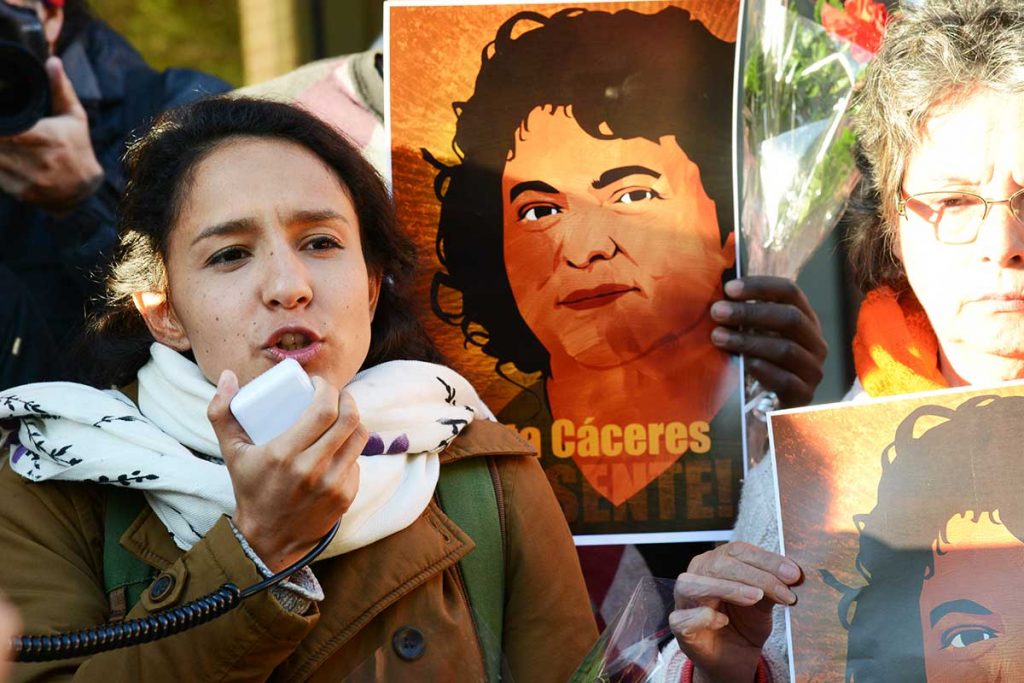
Bertha Cáceres was only 25 years old when her mother, Berta, a world-renowned environmental activist who had led community struggles against the construction of the Agua Zarca dam, was assassinated in 2016. Bertha has taken up her mother’s mantle, becoming coordinator of the Civic Council of Popular Indigenous Organizations of Honduras (COPINH) and continuing the struggle against extractivist projects on indigenous land and an end to corruption, greed, violence and impunity that has marked the Honduran regime, exemplified by the coup in 2010.
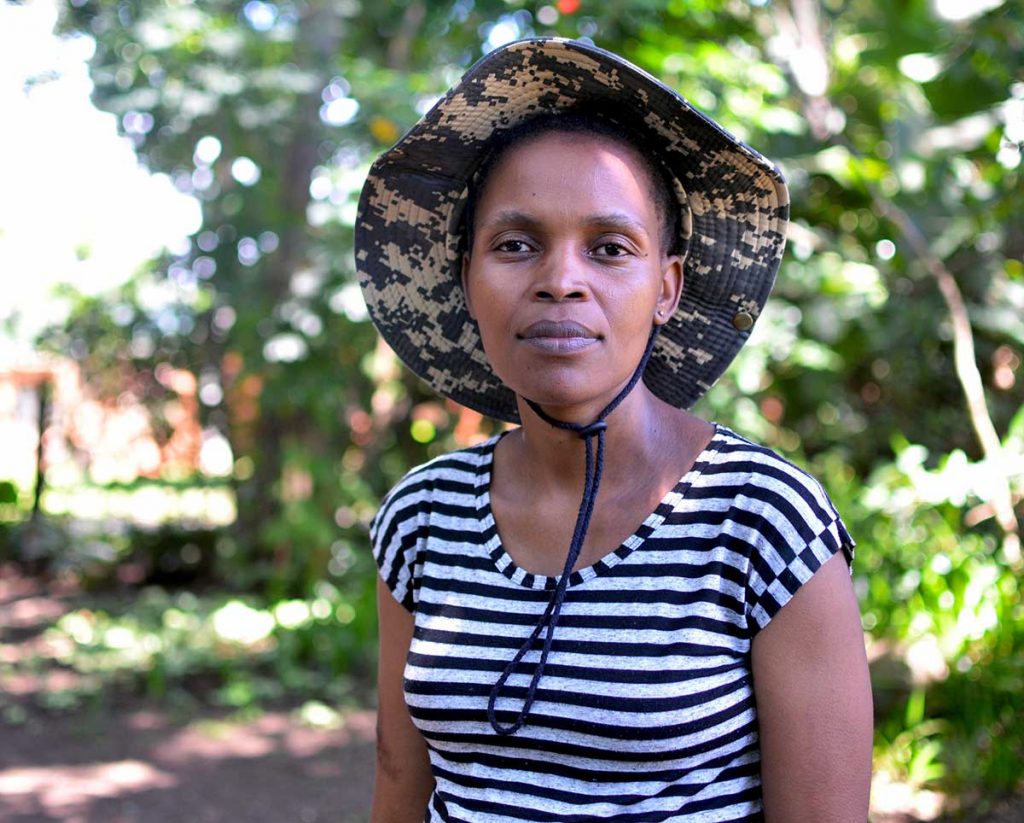
Nonhle Mbuthuma’s close friend was also killed for leading the struggle against a planned huge titanium mine on the beautiful Wild Coast of South Africa’s Eastern Cape, but rather than frightening her, it added ‘fuel to her fire’ of passion and determination to stop the destruction of her community.
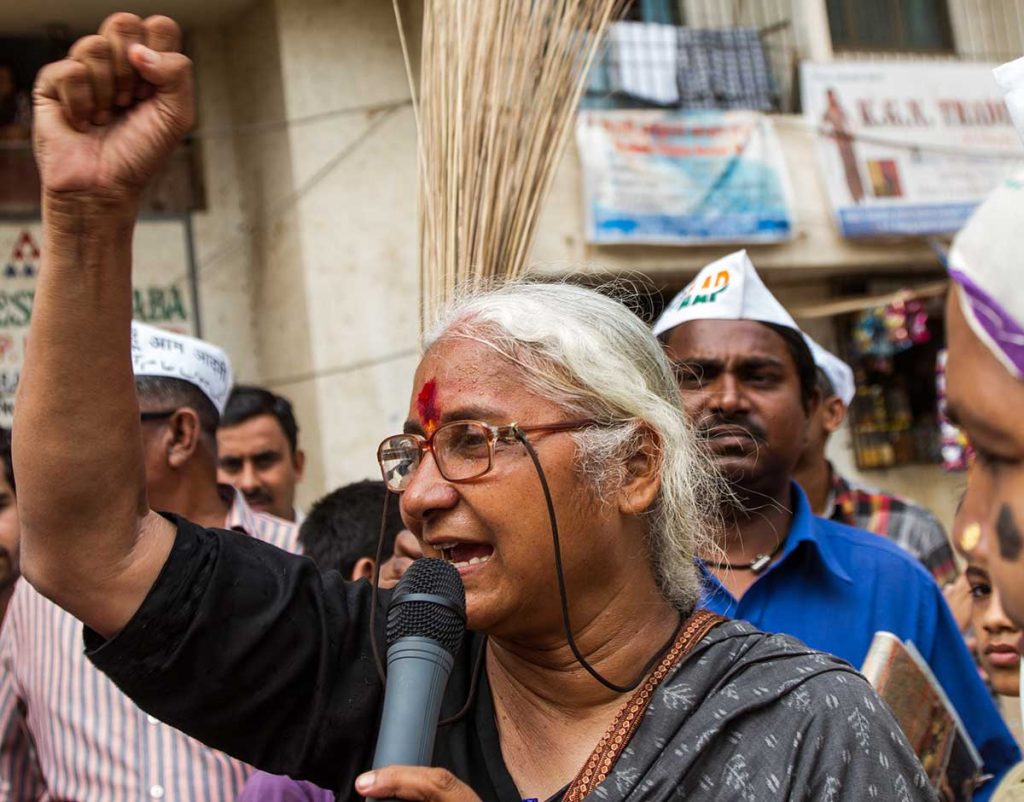
Medha Patkar’s life in India shows the impact of her dogged commitment and her deep belief in the power of people to change history despite the odds. She first toured the site of the proposed Narmada Dam in 1985. More than 30 years later, in July 2017, she started an indefinite fast as women across the valley stood in a Jal Satyagraha up to their necks in the rising waters of the sacred river to demand proper rehabilitation for all those affected by the dam.
Their words speak for themselves but the interviews attest to the instrumental role women have played in their respective struggles, the ways communities have refused to be cowed by the politics of terror, and the importance of movements to remain autonomous, rooted in communities and intelligent and holistic in their strategies and tactics.
How did you become involved in the struggle for social and environmental justice?
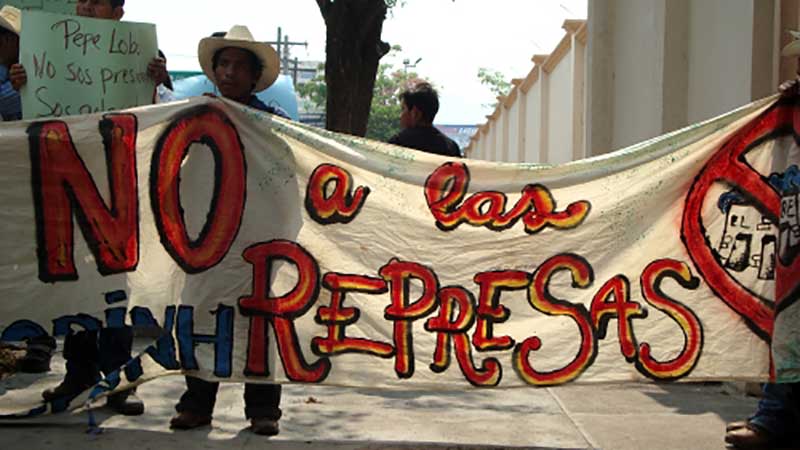
‘No to the Dams’. Bertha Zúñiga Cáceres’s mother, also Bertha Caceres, paid with her life for leading the resistance of the Lenca people to the imposition of the Agua Zarca dam on their local Gualcarque river. Photo credit: Hondurasdelegación
Bertha: Well, my involvement started when I was a child, because I went with my mother to all the COPINH activities and took part in all the struggles. My mother taught me how important it is to get involved in communities, to stand up to those who wield political and economic power, and to learn from the struggle itself. My people – the Lenca people – taught me from a very young age that you can’t remain indifferent to the unjust situation in our communities and the country as a whole.
Medha: My father was a freedom fighter, a trade union leader, so I was always accompanying him to meetings and becoming immersed in its politics. Later as I studied, I developed the same ideology of democratic socialism. In 1985 I was invited to visit Narmada valley and the many villages that would be affected by the proposed dam, the world’s second largest. The friend who had invited me wanted to take legal action to stop the dam, but I realized that it would also require mass resistance as laws were being broken by the government, so I became involved in building a mass campaign.
Nonhle: Honestly, sometimes I don’t know how I got involved. But I know I was influenced by my ancestors and elders. My grandfather was part of the MPondo revolt (the first major uprising against apartheid in 1960-1962) and he always told me stories about how they managed to protect the land before there was any democracy. He and other elders taught me the importance of the land, that it is the only thing we have, that it is the only thing we have to share with future generations and that once it’s gone no compensation will be enough. So as soon as I heard about the mining project, I thought of my grandfather’s stories. That’s how I got involved, but I also know it’s not about fighting for myself, it’s about my community and the next generations.
From your experience, what do you consider the key ingredients for building movements that can challenge established power and build just alternatives to predatory capitalism?
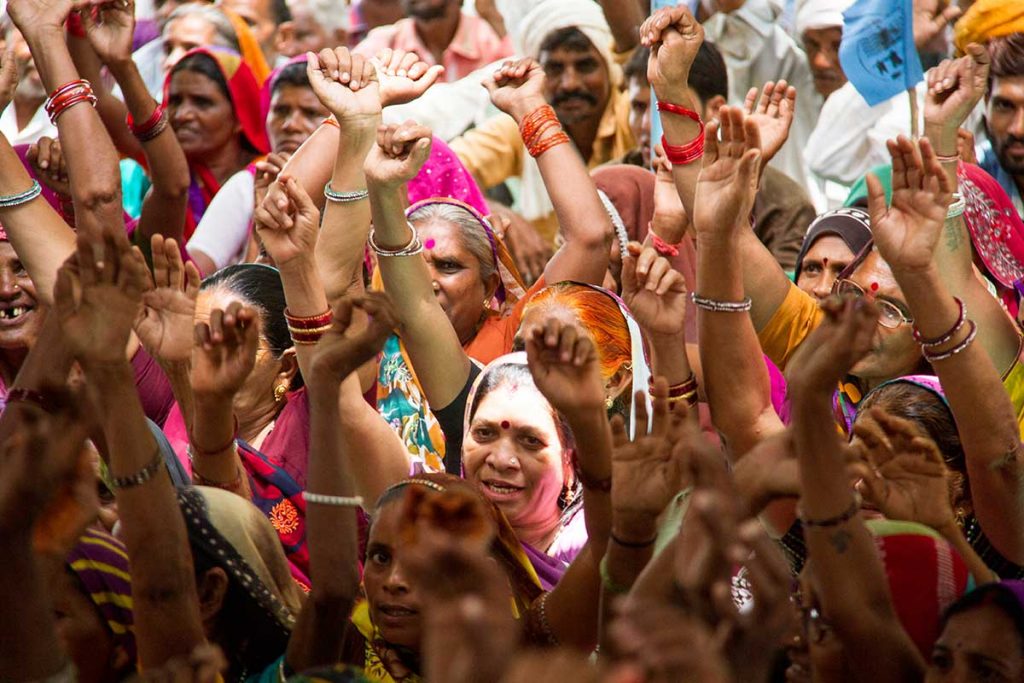
Women protesting the Narmada Dam. Photo credit: Joe Athialy
Bertha: First, movements need to be anchored in grassroots organizations, and let the victims of injustice take the lead as protagonists of the struggle for the control and use of our natural resources, like land and water.
Second, you always have to think about the interconnectedness of these struggles: you can’t separate one issue – such as land – from the others, because it’s a struggle against the whole system. For example, when you’re campaigning for access to school, you’re also fighting for health and healthy food.
Third, we need to build movements that are consistent with our values, and what goes on inside our movements needs to reflect that. It means confronting violence against women in our own movements, because repression can also happen there.
Fourth, it’s important to be internationalist. COPINH is the result of a process specific to Honduras, but it also came out of various uprisings in the Americas, such as the struggles of the many indigenous peoples who have protested against the economic and social system that dominates our continent.
Nonhle: I think the key is to be honest and transparent and mobilized – believing that we are fighting not just for ourselves but also for future generations. It is also critical to put women at the forefront of the struggle. If you look at our struggle, it is mainly led by women – we don’t change our minds so easily. We also know the community cannot be dependent on anyone else, except itself. We know that the government is working hand in hand with companies to oppress our communities, so we have to make it impossible for them to work.
We are demanding the right to say no – what we need is Free Prior and Informed Consent and we are fighting for this. This year in April 2018, we will have a court case, the first in South Africa, to claim this right. If we win the case, it will help other communities. But even if we lose the case or the government proceeds, we will keep fighting regardless to defend our land.
It has also been important for our campaign to get the message out and build solidarity with others. It is difficult in a rural area for people to know what is happening so we need help to pass the message to the media, and build solidarity with other NGOs. If we are just talking here and others don’t know, the struggle will never reach the whole world. We believe you build your house because of other people so this interdependence is crucial.
Medha: First and foremost, you need a broader ideological framework which you then operationalize into specific objectives, linking the micro with the macro. It is not necessary that everyone who participates in a movement shares the full vision – we will all approach issues from different angles and points of view – but key activists in the movement must share a common approach. Besides ideological clarity, activists also must have a deep understanding of people, what they need; the vision and tools that will inspire people and get them emotionally involved.
The goal is to move towards what I call a mass-roots organization (not a grassroots organization as grass can be plucked at any time). In other words, an organization that has many roots, where there is local leadership, where activists are motivating and mobilizing people and building a united force.
Out of this movement comes its articulation, which must happen on various fronts – inside communities but also internationally. For the Sardar Sarovar dams, we had to take on the World Bank and International Financial Institutions (IFIs) that were funding the project. And this required getting support from international quarters and working with international movements.
We also need to work on different fronts because of our understanding of power and human rights. While engaging on human rights relates to the state, and we must use the institutions of law and judiciary to challenge the state, we also believe ultimately in people power, that it is the first pillar of democracy and the foundation of our work. We need constantly to show the power of people and our right to make decisions, otherwise you do not bring people along with you and you are no longer a movement. So we constantly use legal actions and mass actions.
And this isn’t just about tactics either, it is also about values and creativity. In India for example, we are fond of Satyagraha (politics of non-violence) both because it is an effective tactic but also because it demonstrates our values and vision.
We also believe that it is important to educate and also demonstrate alternatives to oppression. So in the National Alliance of People’s Movements, we run schools including real-life schools and projects in areas of health, education and water management. People can’t just spend their whole time fighting, fighting, fighting; we also must demonstrate that there are alternatives.
How do you remain mobilized when faced with so much repression?
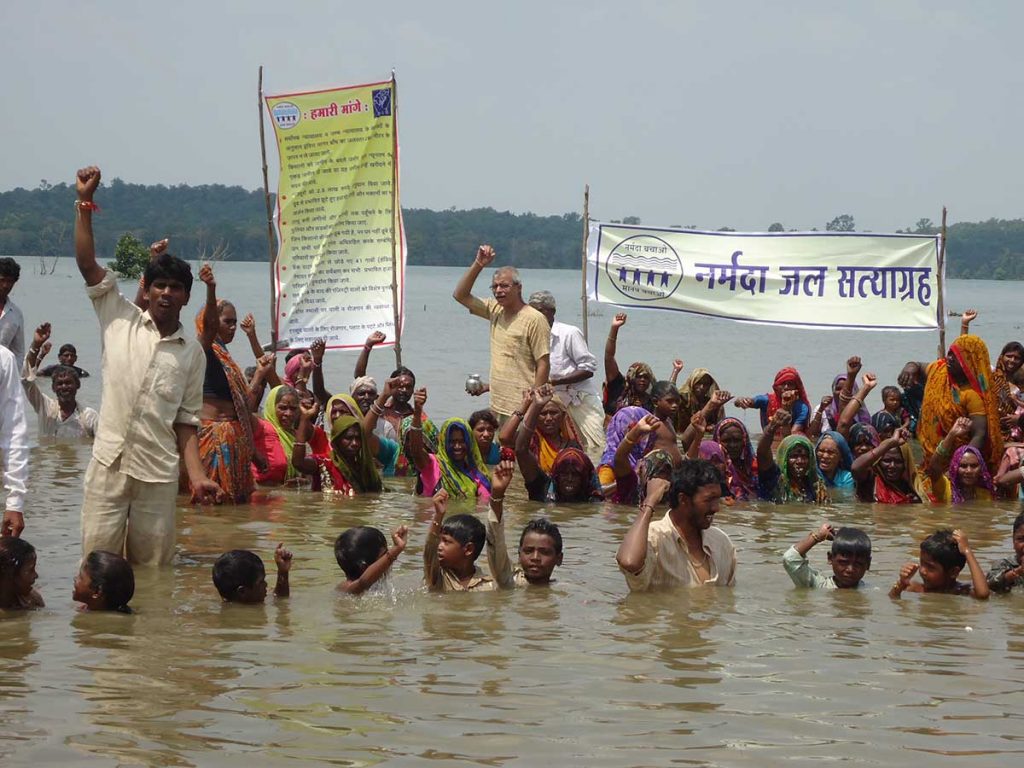
Protestors stand in rising waters in a Jal Satyagraha to demand full rehabilitation of affected communities
Bertha: This has always been part of COPINH’s history. When we were engaged in the struggle for our territory, the response was always very repressive, especially since the coup in 2010. But at the root of our struggle is precisely this deeply-held conviction that we can’t give in to this situation, and that’s what leads us to mobilize and take action. The need for justice means we have to struggle, because we can’t live like this.
We’re also a rebellious people who have fought for our rights for centuries – against the Spanish colonial powers to begin with, and now today against other types of colonialism. We draw strength from our ancestors, who liberated the country and defended our identity as indigenous people. It’s part of our worldview: our ancestors are still walking with us, accompanying us. Our spirituality helps us to cope with these difficult situations.
My mother was never silent in the face of injustice; she was steadfastly committed to the fight against impunity and injustice, and she taught us that we have to face up to the elites who are undermining our future. She always said we have the right to live in a country that respects our rights and a state that serves the people rather than a corrupt oligarchy.
We also understand that we’re not alone in this struggle. We’re part of movements in many communities and groups in Honduras, the continent and the world. This was my mother’s experience. Her strength and her energy came from knowing that she was supported, from the fact that this wasn’t a struggle by one individual, but part of a much longer and wider history.
Nonhle: For us, when we saw the bloodshed, it was like putting petrol on the fire. It mobilized us rather than making us afraid. We became more angry, realizing that if we turned back, we would be selling out those who had died defending the same land. We say that this won’t work, they will have to kill all of us. We cannot compromise with those who shed blood. They made a huge mistake.
Medha: It is an ongoing struggle. The World Bank withdrew because it said the dam could only be completed by unacceptable means and with terrible social and environmental losses. And this has come to be true. The dam may be completed, but there are still 35,000 to 40,000 people – 44 villages and one township – in the submerged area. Yet we continue to struggle. In July 2017, there were 21 sites in the valley where women held fasts, stood barefoot in the water refusing to leave, and stood up to the police to demand promised compensation.
It’s this collective action and spirit that gives hope and keeps people mobilized and motivated. That’s why I am optimistic, because without it as well as courage and determination you cannot carry on.
How do we ensure our movements of counter-power are not co-opted or – worse – replicate oppressive structures of power?
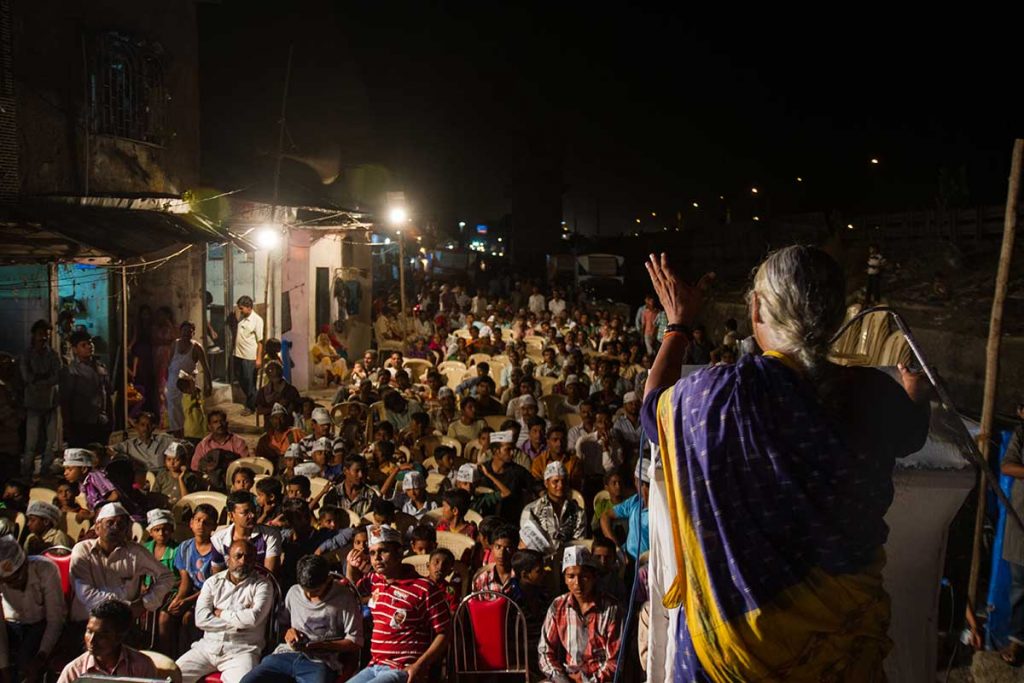
Mehda Patkar addressing a campaign rally in Mumbai. Credit: Joe Athialy
Bertha: Every case is different. But when we say we need our movements to be consistent, we’re talking about not repeating those corrupt practices. We need to build movements on moral foundations. COPINH, for example, has established people’s courts where cases of violence against women in our movement can be denounced. We’re not afraid of naming the corporations that commit abuses and oppress us. And we maintain our autonomy as a movement, defending our territory and denouncing repressive practices, no matter what party is responsible for them.
Medha: It is important to be clear that peoples’ movements must always be mobilized, and organizing people even when there are supportive parties challenging governments or even in power. Parties compromise because they want to win power, so movements must remain out of core power structures and play the role of the real opposition. Social movements must be a non-compromising force.
To remain true to their values, popular movements need to be rooted in their mass base and firm and committed to their goals. Being transparent is key; communicating, regularly evaluating the ways you work. Criticism is important because it is a way to clarify and rethink. It takes time, and many times we fall short, but we must try our best.
Nonhle: When I think back of those who fought for democracy, I have tears in my eyes, because those same people instead of protecting us are oppressing us and making our lives so difficult. Honestly, we just hope that what is happening with the ANC is a big lesson. It is not what our ancestors fought for. I hope one day the ANC will understand that as rural areas we fought for this democracy. Yet when we oppose destructive money they call us ‘anti-development’ and treat us as enemies. They should talk to us. The lessons are that we need to sustain our movements and keep them away from money. If movements become about making money, then it will end your struggle, you will lose your focus and forget what you fight for.
Why have women played a key role in your movement? Do you see the rise of #metoo, #niunmenos as turning points in the struggle against patriarchy?
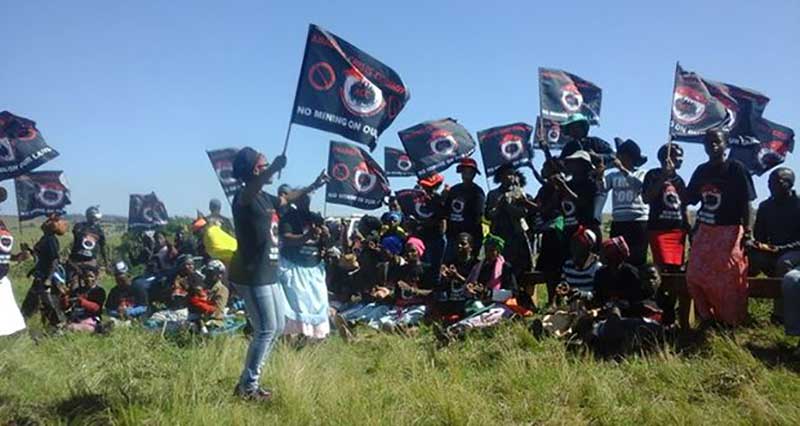
Amadiba Crisis Committee has forced the South African government to temporarily halt the mine on many occasions.
Nonhle: I think women have led this movement, because they will be most affected if mining takes place. They won’t work there, they will need to feed their children, to find clean water – they know what the consequences of mining will look like. Women are also not afraid to stand up; they stick to their beliefs and are not easily bought off. In the anti-apartheid struggle, it was women who led the struggles against the ‘pass laws’ and they are now leading the struggle against this mine. It’s not easy having to think about children, cook, care for the family at the same time as struggling. But women can do that.
Medha: We know from our movements that women are a huge force and therefore social transformation is not possible without women. Women have faith in life, because they give life, because they share values and knowledge with the next generation, are closely connected to nature, and more conscious of our human connections. They undertake most of the labour in this country, whether in the countryside or slums. We also know from experience that without women, our movements wouldn’t sustain long-term actions. Whenever we have challenged the World Bank, government, police and deploy non-violent militant actions, women have played the key role. In the 2017 protests against the dam, women showed massive strength against police.
Women therefore must be at the forefront of challenging established power. We also must put women’s perspectives at the forefront. A feminist vision is key to an alternative view of development. It emphasizes love and compassion, humanity rather than alienation. It has a different relationship to resources too as most of women’s caring actions (feeding children, supporting life) are not based on cash. You can see these values expressed in how we refer to rivers and land as mothers, and therefore resources that must be protected. By contrast, unsustainable and exploitative development is based on a system of patriarchal violence.
Bertha: Patriarchal power is maybe the system of domination most difficult to break, and that’s why it’s so important to build movements dedicated to the principles of gender equity. I have the hope that the clarity with which this issue is coming to light all over the world can be reflected in our own movements and society. But in Honduras there are high levels of violence against women’s bodies, with increasingly brutal state violence against the movements and often against women leaders.
I think the assassination of Berta and other women from the movement reflects an inability to accept the leadership of women who dare to denounce the owners of dams, banks and corporations. It’s hard to know whether this situation is going to improve in Honduras, because we’re very far from building a system of justice and equality for women, but we must continue to be clear about our path and our conviction to defend life and put a stop to violence.
Concluding words
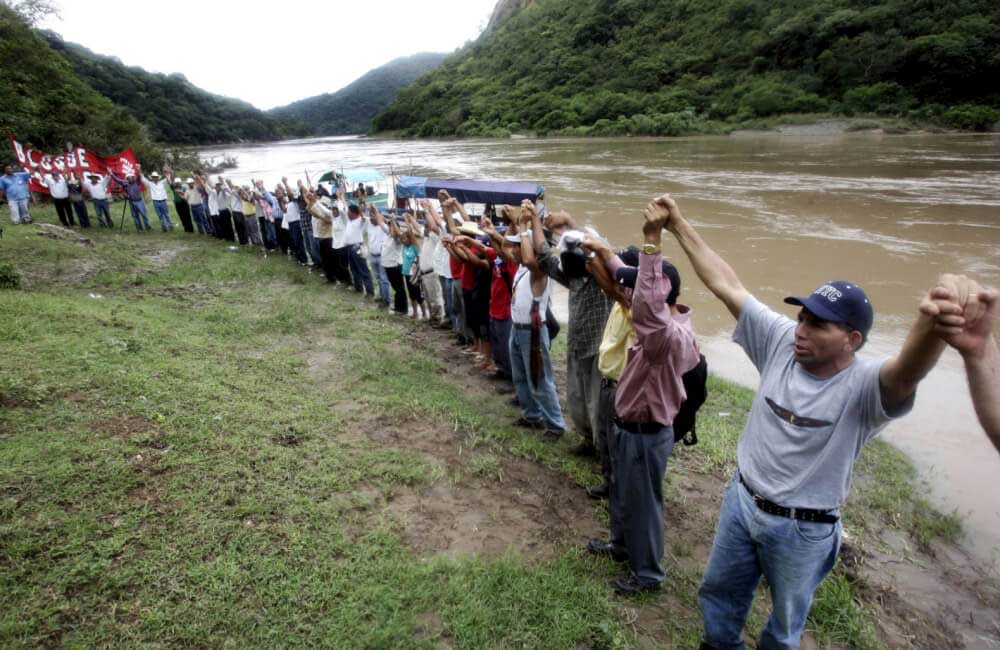
Lenca people gather on the River to demand an end to the Agua Zarca dam project. Photo credit: Marighella Publico
The parting words go to Bertha:
I think all of us are involved in struggles that seek to make our society – and ourselves – more human. There are no set formulas for counter-power because we are all different, but we share the unity of moving forward together, in a consistent and interconnected way, for humanity. We can pass on what we have learned to each other, knowing we stand together in a struggle for life, and that our struggles can bring us closer and make us stronger.
These interviews have been edited for length. The full interviews can be read here:
